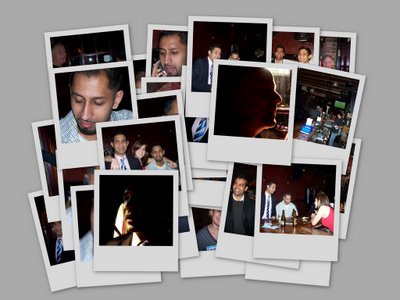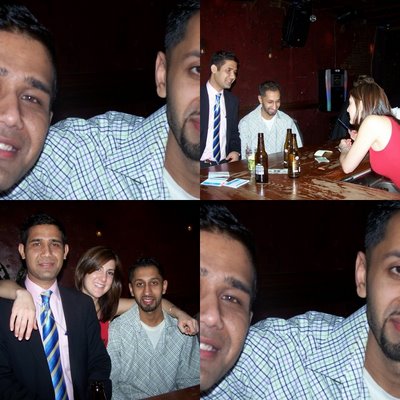




More than a week back Chiran Thapa sent out this email to his close circle of friends.
From: Chiran Thapa
To: many recipients
Date: Tue, 28 Feb 2006 20:59:20 -0500
Subject: PIN-PLAN Happy HourDear All,
You are cordially invited to a Happy Hour organized by yours truly at SNAFU BAR (located on 47th street, between Lexington and 3rd Ave) on March 8th starting 5:30pm -8pm. This event is being organized to serve multiple purposes simultaneously. Given a busy work schedule, the window of opportunity to meet new people is limited. Also, we all know keeping in touch with all our old friends is quite demanding as well. Thus, this event will provide you with that wonderful opportunity of getting together with your old friends and at the same time making new ones simultaneously. But, most importantly, your presence will incidentally serve to benefit a noble cause.
As most of you are aware, there is a bitter conflict that continues to ravage the once peaceful mountainous Kingdom of Nepal. As a peaceful resolution is exigent, yours truly is committed to explore avenues for extrication from the ongoing conflict. It is in this context, I am embarking on a peace-building initiative under the aegis of Center for International Conflict Resolution at Columbia University.
PIN(Peace Initiative for Nepal)- Plan is a peace-building initiative that emphasizes on the need to constructively engage the emerging generation of "Tomorrow's Nepal" to bridge the existing gap amongst different sectors of the Nepalese society.
The primary objectives of this initiative are:
1)To identify and build capacity of the voices of the emerging generation and critically examine their potential role
2)To initiate a dialogue between these new voices to foster inter-relations
3)To pioneer a roadmap for a sustainable peaceful future through deliberations of the participantsThus, rather than being outfitted with a peace-making mission, PIN-Plan will serve as a unique peace-building and capacity building platform. Through dialogue, the initiative not only aims to de-escalate the conflict, but also aims to cultivate a sense of understanding of respective roles. PIN-Plan targets to enhance inter relations and explore constructive mechanisms to sustain harmonious inter-relations.
Since the initiative is at its preliminary phase, no funds have been acquired yet. However, there is a need to conduct a feasibility study due to the participatory nature of the initiative. Thus, there is a dire need of seed money for such an undertaking.
Since the bar has kindly offered to donate a percentage of the proceeds ($10 cover charge) for this cause, I humbly request for your presence. Also, even if you can't make it, please consider forwarding this to your friends and colleagues.
I look forward to seeing you then.
Cordially,
Chiran Jung Thapa
Someone on that list forwarded it to someone else, one person, and that person forwarded it to Brett Buzzini who I know who forwarded to me: "Of any interest?" I forwarded it to Dipta Shah in DC. Dipta called Chiran about it. And Chiran's question to Dipta was, but how did you know!
I have seen Chiran at some of the Nepal events. And Dipta had talked about him a few times, and through Dipta I had come to know Chiran has done graduate level work at Columbia and was now a local staff for the Nepal Mission to the UN.
I was kind of planning on not showing up since I was not on the original list. But Chiran had said it was okay if I came. And then he called again an hour before the event to reassure me that it was okay for me to show. So I went.
This was the first time we got to talk at length, and talk we did. It was quite something to get to meet Chiran's friends, many of them Desis who were born in the US. Diversity is my favorite thing about America. That is why I so love New York City. I especially like the cultural cocktails, people born out of mixed marriages and things like that. Desis born in America, even if born to Indian parents, also are cultural cocktails, hardware Indian, software American. Phir bhi Dil hai Hindustani.
I am open to dialogue with absolutely anyone in the three camps in Nepal. I once met Sharad Chandra Shaha when he was in New York, and I drew a lot of heat for that. I never apologized, never regretted it.
I have talked to many of the top people in the democratic camp. But penetrating the monarchist camp has been hard, penetrating the Maoist camp has been impossible. Once someone gave me a number of a JNU student in Delhi who promptly hung up on me when I asked if he was a Maoist.
Chiran Thapa is an intelligent, knowledgeable, friendly, cool headed, open minded person. He has contacts in the establishment. People from his extended family are in the army. He has a relative who is a personal aide to the king.
Chiran will soon be going to Nepal. He is hoping to get married to someone he has been dating, a Newar, a flight attendant for Qatar Airways. He also hopes to do some peace work. He hopes to meet many people, the king might end up being one of them. We will see.
This casual session today was a prelim for the session on Friday. 10 of us are meeting. He has managed to get together an impressive group of people. I really like the gender balance of the group. Diversity is important.
I consumed quite some popcorn. Later three of us went for pizza, the three last to leave. Chiran, Vivek and me. Vivek worked for Bill Clinton for several years. He said getting a letter from President Clinton wishing peace and democracy for Nepal would be a piece of cake. That was delightful to hear. Clinton is Pele.
The bar Snafu is owned by a Nepali. It is a choice location, not that far from Times Square, not that far from the UN, from Grand Central.
I am hoping we can get some serious work done on Friday.
This was primarily a gathering of Chiran's grad school friends, so these were all also Dipta's friends. I talked at length with this one woman, Caucasian, someone in finance, who is in a relationship with someone of Taiwanese origin. She described Dipta as "solid. He knows what he is doing." We talked about cross cultural relatioships.
Chiran and I discussed the possibility of the king just ploughing on with his roadmap, if that was possible, what the repurcussions were.
Chiran made a powerful metaphor. He said there was one orange. The king wants it. The parties want it. If they were to talk they will realize one wants it for orange juice, the other for the pulp to make paper.